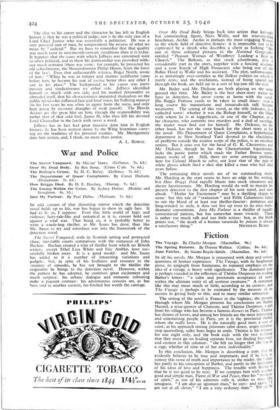War and Police
(Heinemann. 7s. 6d.) How Briggs Died. By D. E. Harding. (Harrap. 7s. 6d.) Into My Parlour. By Paul Dallas. (Methuen. 7s. 6d.)
IN odd corners of that distorting mirror which the detection novel holds up to life, war has begun to show its ugly face. It had to be so, I suppose. Even this little world of logic and violence, fairy-tale-like and untopical as it is, cannot hold out against a total war. That being so, it is probably better to write a whole-hog thriller, as Mr. Innes has done, than like Mr. Stout to try and introduce war into the framework of the detection novel.
The Secret Vanguard, with its Scottish setting and protracted chase, inevitably courts comparison with the romances of John Buchan. Buchan created a type of thriller from which no British writers, except Ethel Lina White and Eric Ambler, have suc- cessfully broken away. It is a good model: and Mr. Innes has added to it a number of interesting variations and gadgets but, in spite of his liveliness and resource in- the creation of . episodes, he has not brought to the thriller the originality he brings to the detection novel. However, within the pattern he has adopted, he contrives great excitement and much surprise: his urbane dialogue and romantic colouring make a piquant contrast : his adventurous conceits are, as has been said in another context, far-fetched but worth the carriage.
Over My Dead Body brings back into action that lethargic but commanding figure, Nero Wolfe, and his wise-cracking henchman, Archie. Archie is perhaps the most engaging Watson in the whole field of detective fiction : it is impossible not to Ix captivated by a sleuth who describes a client as looking "like one of_ those coloured pictures in the National Geographic entitled "Peasant Woman ' of Wczibrrcy Leading. a - Bear to Church." The Balkans, as this crack adumbrates, play a considekable part in the story, together with a fencing academy and a sour bunch of High Financiers who bring out all the Robin Hood in Wolfe and his assistant. The plot, unfortunately, is as irritatingly over-complex as the Balkan politics on which it partly rests; and the revelations, instead of being spaced out through the book, are held up in a sort of log-jam till the end.
Mr. Bailey and Mr. Dickson are both playing on the away ground this time. Mr. Bailey is the best short-story writer we have in detection, but never seems at home with the novel. His Reggie .Fortune needs to be taken in small doses: over a long course his mannerisms and innuendo-ish talk become wearisome. The setting of this novel, as the title indicates, is a cathedral town : whether it was the Bishop himself, or the Dean with whom he is at loggerheads, or one of the Chapter, or a lay character, who commits two murders and a deal of sacrilege, the reader must find out for himself. Mr. Dickson, on the other hand, has not the same knack for the short story as for the novel. His Department of Queer Complaints, a hypothetical department in New Scotland Yard devoted to the elucidation of problems outside the routine scope of the police, is an excellent notion. But it cries out for the hand of G. K. Chesterton; and Mr. Dickson, though he has the Chestertonian legerdemain, lacks the poetic patter which made the Father Brown stories minor works of art. Still, there are some arresting problems here for Colonel March to solve, not least that of the pair of white gloves which fired a shot that killed a man who had died years before.
The remaining thrze novels are of no outstanding merit Mr. Harding at the start seems to have an edge to his writing, but How Briggs Died rapidly blunts into stock situations and dreary facetiousness. Mr. Harding would do well to murder his present detective in the first chapter of his next novel, and start afresh. " Horler for Excitement" may be a thrilling slogan to some: but this tale of " traitorism " and Fifth Columnists failed to stir the blood of at least one thriller-fancier: pompous and long-winded in style, it does not live up even to its own melo- dramatic conventions. Into My Parlour is a thriller of equally conventional pattern, but has somewhat more vivacity. There is rather too much talk and too little action : but, as the blurb points out, "the death of a human tarantula by poison is always


























 Previous page
Previous page